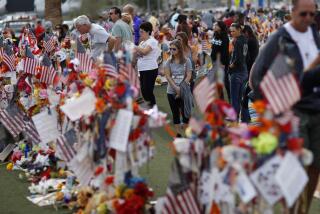SEAL sniper Chris Kyle gets public farewell at Cowboys Stadium
Thousands of well-wishers, including dozens of Navy SEALS, descended on Cowboys Stadium in Arlington, Texas, on Monday to remember the life of a famed Navy SEAL sniper killed at a nearby gun range on Feb. 2.
The body of Chris Kyle, author of “American Sniper: The Autobiography of the Most Lethal Sniper in U.S. Military History” -- an account of Kyle’s four tours in Iraq, where he said he killed at least 160 enemy combatants -- lay in state on the Cowboys’ silver and blue star logo at the 50-yard line, with an American flag draped over his coffin.
The stadium, designed for the fidgety loudness of an NFL game day, instead swallowed the echoes of tributes, scripture readings and country songs dedicated to Kyle, as well as the mournful silences between.
An estimated 7,000 people attended, and Texas Gov. Rick Perry issued a statement that said, in part, “Chris Kyle was the public face of an anonymous breed of American warrior who are handed the hardest missions and assume the largest risks. Chris was among the very best at what he did, and he saved countless American lives in the process. Our state and our nation suffered a profound loss with his passing.”
Although no politician spoke at the service, former Alaska Gov. Sarah Palin was in Dallas on Monday and posted on her Facebook page that she would attend the memorial. “I find it sad to see that flags aren’t flying at half staff for this American hero,” Palin wrote on the page.
According to police, Kyle, 38, and a friend, Chad Littlefield, 35, were shot to death by a fellow Iraq veteran who had been struggling with mental health problems and who they had taken to the gun range for a kind of shooting therapy.
Eddie Ray Routh, a 25-year-old Marine reservist, had been diagnosed with post-traumatic stress disorder, or PTSD, and had been hospitalized multiple times, his family said.
Kyle left behind a wife, Taya, and attendees tweeted photos of the goodbye notes from his two children that were printed on the back of the service’s program: “I love you Dad. You are the best dad ever. I never wanted you to die. I will miss your heart. I will love you even if you died. Love you forever, Baby Girl.” The other, signed “Bubba,” said, “Dad, I miss you a lot. One of the best things that has happened to me is you. I love you Dad. I always will.”
The service blended the unusual mix of the public and the clandestine that swirled through the final years of Kyle’s life; whether friends or comrades in arms, speakers rarely gave their names when remembering the highly decorated veteran who ascended out of the anonymity of service and into the public spotlight.
Country music stars, including Randy Travis and Joe Nichols, didn’t announce themselves before performing the music Kyle liked, nor did the Navy SEAL officials who spoke of Kyle’s service in some of the most fevered encounters of the Iraq war theater over the past decade.
One SEAL official related an account of Kyle staying on his scope after his position came under heavy fire in Ramadi, and another of rescuing a stranded Marine in Fallujah.
But far more commonly throughout the memorial service, friends and co-workers recalled an ornery Texas boy who liked to “choke out” friends and celebrities alike with his forceful brand of horseplay, who was a slob at camp in contrast to the neatness of his shooting, and who loved his fallen comrades so much that he could hardly bear their deaths.
Debbie Lee -- the mother of Marc Allen Lee, the first SEAL to die in Iraq -- recalled that Kyle “adopted” her after her son died and earmarked earnings from his book sales for her family.
“Chris didn’t publish that book for an income or to be famous,” Lee said. “He hated the spotlight. Chris did that for his teammates” and to show the country what his experience had been like. She added that he didn’t take a salary from the nonprofit foundation he helped start for veterans.
“He didn’t give out of abundance.… He trusted that God would provide for him and his family,” she said.
The service largely skirted the darker portions of Kyle’s life after war, which he had detailed in his book -- problems with drinking and depression and a likely case of PTSD. His marriage too had fallen under strain.
Kyle’s wife, Taya, however, in an emotional and frank recollection of her husband, credited Littlefield with helping Kyle get back in shape after he returned home from duty. She said Littlefield -- who has received much less attention in the aftermath of the shooting -- was the anchor that helped Kyle right himself.
Speaking only a few yards from her husband’s coffin, Taya recalled a man she fought with and loved endlessly.
“You taught me innocent, reckless love without abandon,” she said. “You taught me how to turn a life full of fear into a life full of faith. You taught me that I could be more independent than I ever wanted to be. You taught me how to raise children with love and softness and proved it could be done with a high standard of respect and old-fashioned values.”
Before the trumpeter began to play taps for her husband, she said, “I love you, Chris. I love you.”
ALSO:
Former Californian gets Medal of Honor for valor in Afghanistan
In Northeast, Monday is a day of struggling to dig out from blizzard
Judge delays hearing of accused 9/11 plotters amid new spying allegations
More to Read
Sign up for Essential California
The most important California stories and recommendations in your inbox every morning.
You may occasionally receive promotional content from the Los Angeles Times.











